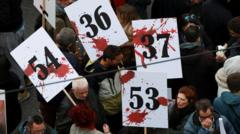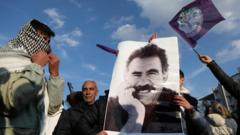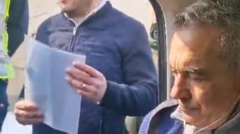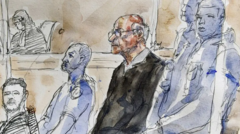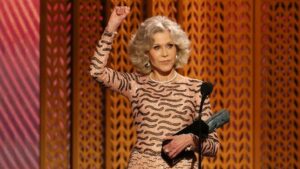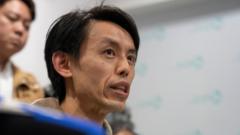As the shadows of Beijing's oppression stretch across Hong Kong, the memories of a once vibrant pro-democracy movement endure through the eyes of those who lived it. Despite the silence imposed by strict security laws, activists cling to their identities, seeking to honor their past even as their city transforms.
Memories of Resistance: The Lingering Spirit of Hong Kong's Protest Era

Memories of Resistance: The Lingering Spirit of Hong Kong's Protest Era
A nostalgic look at the remnants of Hong Kong’s pro-democracy movement amidst increasing repression.
Kenneth walked through Victoria Park, a place once alive with the fervor of pro-democracy protests in Hong Kong. Memories flooded back to him as he recalled participating in Lunar New Year fairs alongside political activists and attending mass vigils for the Tiananmen massacre. Today, those scenes are a distant echo, with protests suppressed, the vibrant stalls gone, and countless activists imprisoned. Kenneth, who prefers to remain anonymous, muses on the erasure of Hong Kong's political identity, reflecting, “Our city’s character is disappearing.”
From a distance, Hong Kong appears unchanged, its trams still bustling and neon signs aglow. Yet a deeper examination reveals an unsettling transformation: mainland Mandarin increasingly replaces the native Cantonese in this city that once prided itself on a unique cultural identity. Over the past decade, hundreds of thousands participated in protests, igniting a movement sparked by demands for democracy. Yet that spirit has been crushed under Beijing's iron grip.
The pro-democracy assurances promised during Hong Kong’s 1997 handover have waned, silenced by laws designed to foster “stability.” Kenneth lives cautiously, balancing memories of freedoms past against a new reality where political discourse is stifled, and even the slightest act of dissent carries heavy consequences. Former scholars of the movement—like Benny Tai, now imprisoned—represent the cost of this struggle. Facing criminal charges, activists including Joshua Wong have taken up the mantle of defiance, shouting their love for Hong Kong from courtrooms as they receive sentences.
As Kenneth retraces familiar haunts, he recalls when he choked on tear gas during protests in 2014, urging Hongkongers to protect their autonomy. He remains hopeful that collective memories will persist despite systematic attempts to expunge the past. “Forgetting the past is a form of betrayal,” he insists, as he spots remnants of old battles marked on familiar walls of his alma mater, PolyU.
Meanwhile, others, like Kasumi Law, have fled abroad, grappling with homesickness and nostalgia for the vibrancy of the Hong Kong they knew. Now living in the UK, Kasumi reminisces about childhood joys and the beauty of her hometown’s sea. Yet upon returning to visit, she is stricken by the changes—lost shops, new faces speaking Mandarin, and the pall of fear lingering over her once bustling home.
Though she embraces her new life, Kasumi remains determined to nurture her daughter’s connection to their heritage. “She gets angry and argues when called Chinese,” Kasumi shares proudly. “She insists she’s a Hongkonger.”
The struggle for identity continues in both Hong Kong and around the world as memories of resistance fuel the spirit of those who refuse to forget. As long as there are voices longing for freedom amidst the silence, the spirit of the Umbrella Movement may never truly fade.

